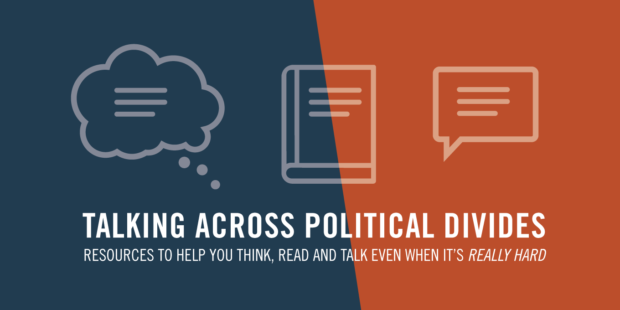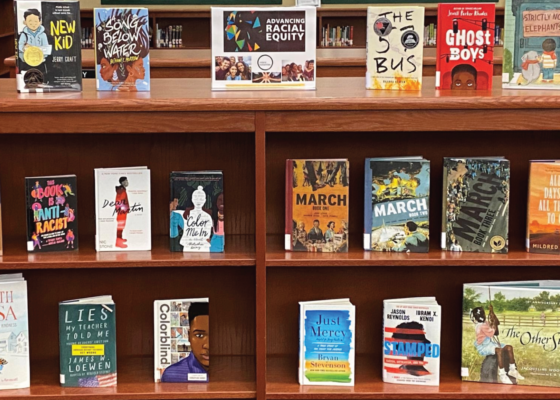Talking Across Political Divides: Resources to Help You Think, Read and Talk Even When It’s Really Hard
November 2, 2020Many people and organizations have reached out, asking for advice and tools for having productive conversations about politics. In fact, some of that advice will be featured in an upcoming free virtual…

Many people and organizations have reached out, asking for advice and tools for having productive conversations about politics. In fact, some of that advice will be featured in an upcoming free virtual program hosted by Indiana Public Broadcasting and Side Effects, with an assist from Indiana Humanities, on November 18: RSVP here. If you can’t wait until then, I’ve compiled a few of the good ideas I’ve gathered.
My biggest piece of advice: listen to understand, not to persuade. Most of the resources I share below are premised on this basic principle. Persuasion is inherently political; while there’s a time and a place for that, it’s not necessarily the route to talking across a heated divide.
Here are some tips to get started:
- Go in with intellectual humility. That’s the advice of Jennifer Thompson, who runs the Center for the Study of Liberty and is a philosopher by training. Assume you don’t know everything and have something to learn by engaging in conversation. Know that the person you’re talking with (and not you!) is an expert in their own experience. Be open to having your mind expanded or changed, even if that’s not the stated goal at the outset.
- Be intentional, not sloppy. Politics is heated at the best of times, and in the weeks following a presidential election, even more so. Prepare by jotting down some open-ended questions or using one of the toolkits listed below. Ijeoma Olou, in her book So You Want to Talk About Race, gives this good advice: State your intentions and why you’re having the conversation. A lot of guides start with “get to know you” questions, rather than jumping right in to talking about politics; it reminds us that we’re talking to a real and complex person, with lots of life experiences that have shaped who they are and how they see things.
- Oluo has a lot of good advice about monitoring your own reactions during conversation and avoiding certain behaviors. Among these: When you feel defensive, ask yourself why. Don’t tone police. Ask yourself, “Am I trying to do right, or do better?” Braver Angels advises to avoid using terms to characterize the other person’s viewpoints that they haven’t used themselves—I think that’s smart! To all of these, I’ll add: Avoid generalizations; they’re never completely true and tend to turn people off.
Here are some questions I really love for talking productively and thoughtfully about politics. You’ll probably notice that they’re open-ended, rather than “yes/no” or “agree/disagree.” These are adapted from Braver Angels’ 1:1 toolkits, the Living Room Conversations toolkit, and the Make America Dinner Again program guide.
- What principles or values guide you, generally? Another way to ask this, from the Living Room Conversations guide, is: “What sense of purpose, mission or duty guides you?”
- Generally, how would you describe yourself politically, and what experiences shaped that outlook?
- What experiences shaped your outlook on X issue?
- What do you like about your own side’s beliefs or principles?
Guides also often ask you to reflect on each other’s answers. For instance, near the end of a conversation, ask yourself (and then share): “What did I hear the other person say about the things they like about their own side’s perspectives? Did they give a reason that has anything in common with how I described what I like about my side?” “Did I hear anything that surprised me, and why?” “Did I come to understand my own viewpoints better, and how?” It’s naïve to think that all conversations about politics, even if well-intentioned, will go perfectly. Better Angels has some great advice for what to do if things go wrong. Among them: Apologize. Don’t jump back in. Don’t insist people give you credit for your intentions. Don’t beat yourself up. Maybe most importantly: Remember, it’s worth the risk and commit to trying again. Below I’ve listed some other resources but I’ll leave with something Thompson told me that I’ve been mulling on a lot: Sometimes it’s okay not to have a conversation about politics. Resources & Guides
- 1:1 conversations from the Braver Angels initiative (By the way, they’re actively looking for people from rural areas and people with conservative viewpoints to take part in these discussions. Please email me if you want to learn more, or want to attend one of their trainings in Indiana, such as “Skills for Bridging the Divide.”)
- Living Room Conversations
- Civil Squared podast: There are so many excellent episodes, but maybe start with this one featuring Tania Israel, the author of Beyond Your Bubble: How to Connect Across the Political Divide, Skills and Strategies for Conversations that Work.)


